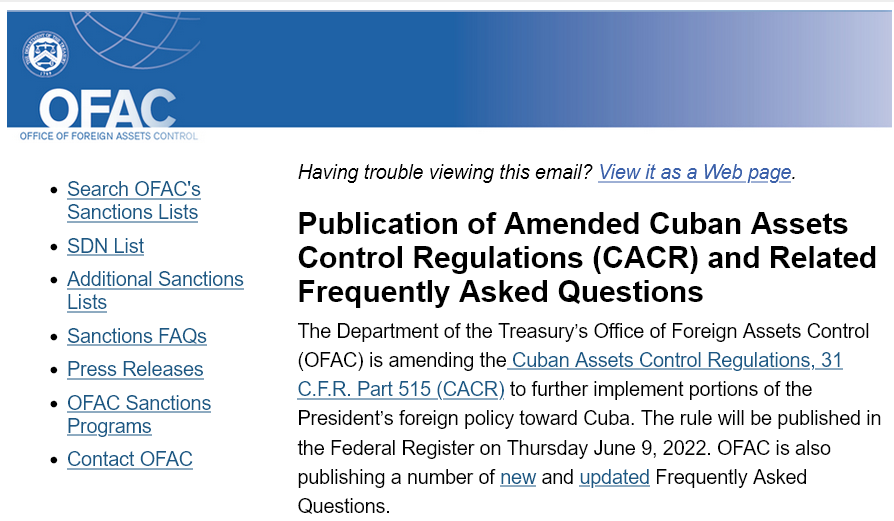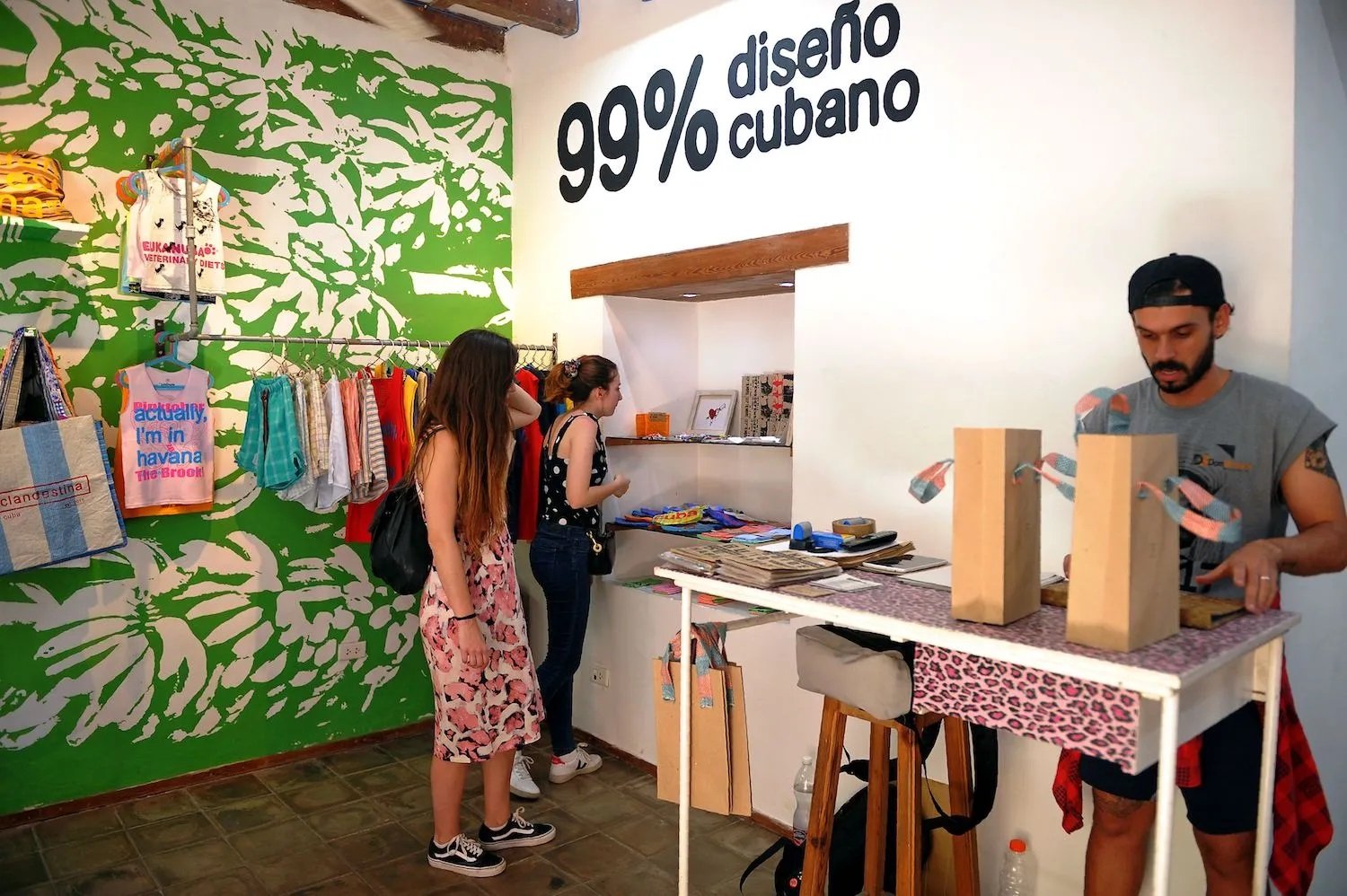Remittances Mentioned 16 Times In 14 Pages Of New OFAC Cuba Regulations. So Why Do Messrs. Biden, Blinken, Sullivan, Nichols, Gonzalez, And Ms. Yellen Endorse And Require Third-Country Banks To Receive A Percentage Of Payments Companies Receive From Cuba And Payments Companies Send To Cuba? How Does This Benefit Cuba’s Entrepreneurs?
OFAC Regulations Are Not Useful If They Are Impractical
One-Way Banking Is Authorized
Two-Way Banking Should Not Be A “Tilting At Windmill” Moment
Merriam-Webster Dictionary- “tilt at windmills”
Definition: to use time and energy to attack an enemy or problem that is not real or important
The wind does not always blow in one direction… so the only wasted effort is an effort not made.
What do these officials have in common? Joseph Biden-President of the United States, Antony Blinken- United States Secretary of State, Janet Yellen- United States Secretary of the Treasury, Jacob Sullivan- Assistant to the President for National Security Affairs, Brian Nichols- Assistant Secretary of State for Western Hemisphere Affairs, and Juan Gonzalez- Senior Director for Western Hemisphere Affairs at the National Security Council in The White House.
They believe funds from the Republic of Cuba to pay United States exporters of agricultural commodities, food products, and healthcare products should be a profit center for financial institutions in third countries.
They believe funds from the United States in the form of remittances, telecommunications payments, overflight payments, aircraft landing fees, and payments for authorized travel purposes should be a profit center for financial institutions in third countries.
There can be a collective “courage of ignorance” excuse for the five men- none of whom have a professional background in finance, but have spent considerable time on the United States government payroll. However, no excuse from the lone woman- who is a former chair of the United States Federal Reserve, former member of the United States Federal Reserve, president of the Federal Reserve Bank of San Francisco, chair of The White House Council of Economic Advisors, and holder of a PhD in economics from Yale University.
Would these six individuals be comfortable with their bi-weekly payroll check issued by the United States Department of the Treasury having first to clear through a financial institution located in Canada, France, or Mexico before making its way into their personal checking account? Oh, and that financial institution in Canada, France, or Mexico would take a commission. Comfortable?
On 8 June 2022, the Biden-Harris Administration (2021- ) published revised and new Republic of Cuba-related regulations by the Office of Foreign Assets Control (OFAC) of the United States Department of the Treasury. The Bureau of Industry and Security (BIS) of the United States Department of Commerce has yet to publish guidance. LINK To OFAC Regulations
The word “remittances” was referenced sixteen times in the fourteen-page text of the revised and new OFAC Cuba Regulations.
Highlighting the importance of remittances is commendable- and important. Failing to provide for straight-line cost-effective efficient delivery of remittances and straight-line cost-effective efficient delivery of payments to the United States from the Republic of Cuba is condemnable- and important. Both are essential to support, promote, and engage- as the Biden-Harris Administration professes to want, with the self-employed and re-emerging micro, small, and medium-sized enterprises (MSMEs) in the Republic of Cuba.
The Biden-Harris Administration had an opportunity to make what it promoted be also useable. Would the OFAC regulations not only authorize a transaction, an activity, but provide a regulatory landscape to enable individuals and companies subject to United States jurisdiction to engage in the transaction and participate in the activity?
Are the regulations issued by the OFAC useful and practical. Are they written in such a manner that individuals will not understand them and legal counsel at companies will understand them and decide that the supposed opportunities presented are not implementable. Are the regulations a lay person’s nightmare and an attorney’s income stream?
There were considerable political pressures directed toward The White House for the Biden-Harris Administration to talk big, but craft a short leash. To some constituencies present that many opportunities exist. To other constituencies present that the changes and revisions are no big deal, nothing to see here; don’t lose any sleep.
The fear was the Biden-Harris Administration would succumb to publishing “feal good” regulations where The White House and the United States Department of State will expound upon all of the new means of engagement- but in practical terms what is included and what is left out make implementation so cumbersome, so in need of compliance measures, that value to the supposed beneficiaries- in the case of the re-emerging MSMEs in the Republic of Cuba, are absent.
The Biden-Harris Administration did importantly include in the new and revised OFAC regulations a focus upon funding support for MSMEs. The Biden-Harris Administration did under a separate specific license authorize the first direct equity investment in and the first direct financing to a MSME.
Unfortunately, there remains distance from stated intention and practical implementation. Taking credit for permitting what is not practically implementable has resurfaced a theme from the past and the fear that derived from it.
The fear was justified as some of the individuals within the Biden-Harris Administration, those who are political appointees and those who are careerists, have in common employment during the Obama-Biden Administration (2009-2017) and particularly the period from 17 December 2014 when the re-establishment of formal diplomatic relations was announced to 20 January 2017 when the Trump-Pence Administration (2017-2021) arrived to The White House.
It was these individuals who in 2015 presented to the public as a valuable, viable, tool of engagement from the OFAC that a financial institution subject to United States jurisdiction was authorized to establish an account in the Republic of Cuba with a Republic of Cuba government-operated financial institution.
That was the good news.
In the next paragraph from the OFAC was the statement that Republic of Cuba government-operated financial institutions would not be permitted to establish an account with a financial institution subject to United States jurisdiction.
That was the bad news.
Add the good news to the bad news and the result was an unusable opportunity. Not insignificant to note that prior to the publication of regulations for Direct Correspondent Banking, the individuals responsible for crafting the regulation were advised that absent two-way transactions, Direct Correspondent Banking would not be operational. The “opportunity” would in reality be a fraud because known in advance that the “opportunity” was not implementable.
From OFAC Frequently Asked Questions
744. May correspondent accounts authorized pursuant to 31 CFR § 515.584(a) or used for transactions authorized by 31 CFR § 515.584(g) be established and maintained in U.S. dollars?
Yes. Correspondent accounts of depository institutions (as defined in 31 CFR § 515.333) at a financial institution that is a national of Cuba authorized pursuant to § 515.584(a) may be established and maintained in U.S. dollars. Such accounts may be used only for transactions that are authorized by or exempt from the CACR. Transactions necessary to establish and maintain such correspondent accounts —– such as originating, processing, and terminating authorized funds transfers in U.S. dollars —– are authorized.
Additionally, correspondent accounts used for transactions authorized by 31 CFR § 515.584(g), which permits banking institutions as defined in 31 CFR § 515.314(g) that are persons subject to U.S. jurisdiction to accept, process, and give credit to U.S. dollar monetary instruments presented indirectly by a financial institution that is a national of Cuba, may be denominated in U.S. dollars.
However, financial institutions that are nationals of Cuba remain prohibited from opening correspondent accounts at a U.S. financial institution. For a complete description of what these general licenses authorize and the restrictions that apply, see 31 CFR § 515.584(a) and (g). § 515.584 Certain financial transactions involving Cuba.
Correspondent accounts. Depository institutions, as defined in § 515.333, are authorized to engage in all transactions necessary to establish and maintain correspondent accounts at a financial institution that is a national of Cuba, provided that such accounts are used only for transactions authorized pursuant to, or exempt from, this part.
(g) Any banking institution, as defined in § 515.314, that is a person subject to U.S. jurisdiction is authorized to accept, process, and give value to U.S. dollar monetary instruments presented for processing and payment by a banking institution located in a third country that is not a person subject to U.S. jurisdiction or a Cuban national and that has received the U.S. dollar monetary instruments from a financial institution that is a national of Cuba for which it maintains a correspondent account and which received the U.S. dollar monetary instruments in connection with an underlying transaction that is authorized, exempt, or otherwise not prohibited by this part, such as dollars spent in Cuba by authorized travelers or a third-country transaction that is not prohibited by this part. Note to paragraph (g): Correspondent accounts used for transactions authorized pursuant to § 515.584(g) may be denominated in U.S. dollars.
If another definition for disingenuous is sought, then what the Obama-Biden Administration did in 2015 was then and remains today for the Biden-Harris Administration a terrific example.
In 2015, Pompano Beach, Florida-based Stonegate Bank (2017 assets approximately US$2.9 billion) was vetted by the OFAC and approved for a correspondent banking relationship with Banco Internacional de Comercia SA (BICSA), a member of Republic of Cuba government-operated Grupo Nuevo Banca SA, created by Corporate Charter No. 49 in 1993 and commenced operation in 1994. In 2017, Conway, Arkansas-based Home BancShares (2020 assets approximately US$16 billion) through its subsidiary Centennial Bank purchased Stonegate Bank.
According to the Republic of Cuba, “Its [BICSA] main activity is ‘enterprises’ bank’ carried through its central services and five branches based in the country’s capital, Santiago de Cuba and Villa Clara. It records all transactions in real time providing its customers with card and remote banking services while it is working on developing other methods of electronic banking. Its institutional clients, national or foreign, receive a complete accounting and documentary service, while national entities also enjoy of significant volumes of credit facilities. Practically all sectors of the economy benefit from all this, such as that of agriculture, the food industry, the basic and light industries, transportation, aviation, fishing, construction, domestic and foreign trade, the iron and steel industry, sugar, informatics, communications and others with not only economic importance but also social, such as health, water supply, education, culture and sports. Credit policy followed by the Bank is dictated in a collegiate way by its Credit Committee on the basis of a strict analysis and control in loan making. The Bank counts on correspondents in the five continents, the majority are first class banks, mainly Europeans and Americans. Equity capital of shareholders (Grupo Nueva Banca with the biggest share and Bancholding), near the USD95 millions with a balance ranging from 550 to 600 millions, make sure the Bank has a strong solvency ratio.”
Stonegate Bank provided commercial operating accounts for the Embassy of the Republic of Cuba in Washington, DC, and the Permanent Mission of the Republic of Cuba to the United Nations in New York City, New York; and other types of OFAC-authorized and BIS-authorized transactions.
Without explanation the Obama Administration did not authorize BICSA under a license from the OFAC to have an account at Stonegate Bank, so Stonegate Bank routed transactions for approximately eighty (80) customers on a regular basis through Panama City, Panama-based Multibank (2019 assets approximately US$5 billion) which had dealings with the Republic of Cuba.
However, on 16 June 2020, Bogota, Colombia-based Grupo Aval (2020 assets approximately US$79 billion) reported that “On May 25th, Banco de Bogotá, through its subsidiary Leasing Bogotá S.A. Panamá, acquired 96.6% of the ordinary shares of Multi Financial Group. As part of the acquisition process, MFG’s operation in Cuba was closed and as part of the transaction. Grupo Aval complies with OFAC regulations and doesn't have transactional relationships with Cuba.”
Absent Direct Correspondent Banking, authorized transactions from the Republic of Cuba to the United States are multi-day rather than less than multi-hour and third parties earn unnecessary fees.
By United States law and by regulation, the implementation of Direct Correspondent Banking requires transparency by the participating United States-based financial institution and transparency by the non-United States-based financial institution. Direct Correspondent Banking activity must comply with regulations of the Financial Crimes Enforcement Network (FinCEN) of the United States Department of the Treasury and provisions of the 2001 USA Patriot Act.
If the Republic of Cuba accepts Direct Correspondent Banking, a result will be an increased transparency, accountability and efficiency for financial institution operations within in the Republic of Cuba. This benefits the [Miguel] Diaz-Canel Administration (2018- ) in the city of Havana and the Biden-Harris Administration in Washington DC.
This is the result of the Direct Correspondent Banking decision by the Obama-Biden Administration which has since continued during the Biden-Harris Administration: Since December 2001, the approximately US$6.7 billion in payments from the Republic of Cuba to the United States for agricultural commodities, food products, and healthcare products exports to the Republic of Cuba; and all payments from the United States to the Republic of Cuba for electronic remittances, Airbnb-related, authorized travel, overflights, artwork, have flowed through a third country before reaching the bank accounts of United States companies.
For perspective, since the Cuban Democracy Act (CDA) became effective in October 1992, the Trade Sanctions Reform and Export Enhancement Act (TSREEA) became effective in October 2000, and the OFAC, the BIS and the United States Department of State have authorized other transactions, more than US$6.7 billion in payments for agricultural equipment, construction equipment, agricultural commodities, food products, medical equipment, medical instruments, medical supplies, pharmaceuticals, healthcare products, and travel-related services (including airline landing fees, telecommunications, etc.) have been subject to a triangular process through financial institutions located in third countries and then to United States financial institutions.
A financial institution located in Canada, Mexico, Panama, France, Spain, among other countries receive a fee to move funds that they had nothing to do with generating.
Banks in third-countries have been winning a multi-million dollar payment lottery every month for thirty (30) years.
Direct Correspondent Banking far more benefits United States exporters than it does Republic of Cuba-based importers. Direct Correspondent Banking means less time for United States exporters to be paid and less cost to receive those payments.
Enabling Direct Correspondent Banking would be one immensely significant decision by the Biden Administration as it would benefit authorized commercial transactions and compel Republic of Cuba government-operated financial institutions to be transparent and comply with United States regulations, resulting in greater confidence towards the Republic of Cuba and increased accountability by the Republic of Cuba.
According to one senior-level executive of a New York, New York-based financial institution, "banks in other countries have been lottery winners since December 2001; I'm confident the Biden [-Harris] Administration appreciates that United States farmers should not have to give-up anything in order to export their products. The Obama Administration could have, should have done something. They didn't. Now, the Biden Administration can right that wrong and authorize direct correspondent banking transactions."
The Obama-Biden Administration did and the Biden-Harris Administration continues to perpetuate this United States government-mandated theft of funds that if removed could be used to increase exports from the United States to the Republic of Cuba.
“Which is why I’m proud to say: If you look at my presidency so far, it’s a jobs presidency and it’s a small business presidency.” Joseph Biden
“But Cuba is not represented solely by its leadership. There are many different sectors that we can and should work with to support progress in Cuba- including entrepreneurs, religious groups, universities, young people and human rights defenders.” Joseph Biden
“The United States recommits to accompanying the Cuban people in your quest to determine your own future. We will support those improving the lives of families and workers, cuentapropistas who have forged their own economic paths, and all who are building a better Cuba- and a better tomorrow for themselves in Cuba.” Antony Blinken
For Joseph Biden, the self-anointed “Small Business President” of the United States, will if he does not change the current OFAC regulations to authorize Direct Correspondent Banking, be more appropriately referred to as the “Small Business Impediment President” of the United States.
The Biden-Harris Administration should not only authorize a transaction, an activity, but provide a regulatory landscape that will enable individuals and companies subject to United States jurisdiction to use what is authorized. Absent this usability, the government of the Republic of Cuba will again be on the offense rather than the defense.
The United States government should always be ahead of what the government of the Republic of Cuba permits its entrepreneurs to do…. Always.
If the re-emerging private sectors in the Republic of Cuba are to benefit meaningfully it is critical that individuals subject to United States jurisdiction visiting the Republic of Cuba put money into privately-owned restaurants, arts and crafts workshops, dance studios, beauty salons, performing musicians, taxis, etc.
Authorizing Direct Correspondent Banking is a key component to assist entrepreneurs in the Republic of Cuba to benefit from engagement with sources of inputs, investment, and financing located throughout the United States.
Given the hope and vocal support the Biden-Harris Administration has invested in Republic of Cuba’s entrepreneurs, it would be an epic policy failure amounting to betrayal to deprive those entrepreneurs with a direct, efficient, and cost-effective means of receiving and sending funds- particularly from the newly-authorized sources of direct equity investment and direct financing, courtesy of the Biden-Harris Administration.
Make the tools available in the new OFAC regulations be useful and inspirational, not just wishful.
LINK TO COMPLETE ANALYSIS IN PDF FORMAT








































